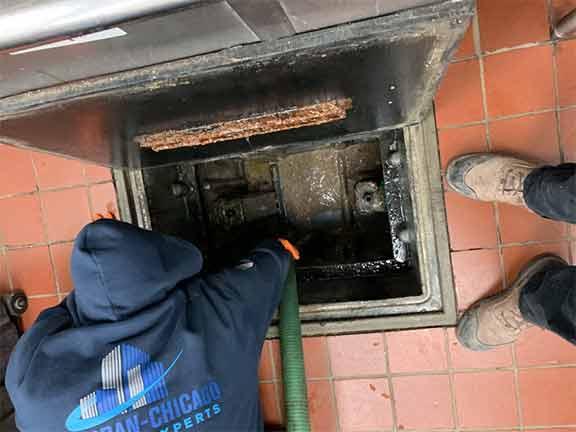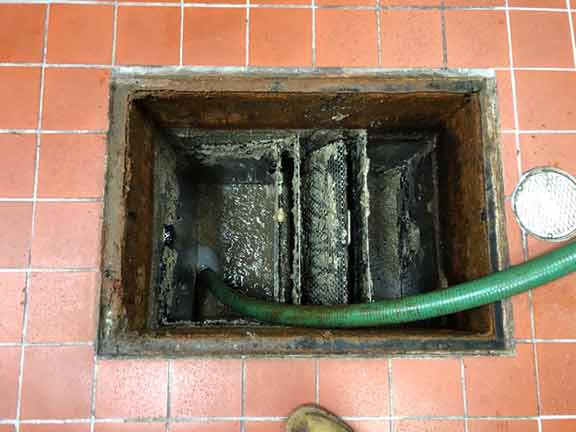Importance of Regular Grease Trap Cleanout
Running a successful restaurant in Chicago requires careful attention to several factors, including food quality, customer service, and cleanliness. One aspect that is often overlooked is the maintenance of the grease trap. A grease trap is a vital component of any restaurant’s plumbing system as it prevents grease and oil from entering the sewer lines, thereby avoiding costly clogs and environmental issues. However, for a grease trap to function effectively, it needs regular cleanouts. In this article, we will discuss the importance of scheduling a grease trap cleanout and how often it should be done for optimal performance.
Understanding Grease Trap Functionality
Before delving into the topic of scheduling grease trap cleanouts, it’s essential to understand the functionality of a grease trap. A grease trap is a plumbing device designed to capture and separate grease, oil, and solid waste from wastewater, preventing these substances from entering the sewer system. It consists of a large tank that allows wastewater to flow through while slowing down the flow rate. As the wastewater cools down, the grease and oil rise to the top, solid waste settles at the bottom, and cleaner water flows out through an outlet pipe.
Over time, the grease and oil accumulate in the trap, necessitating regular cleanouts to prevent the trap from overflowing and causing drainage issues.
Signs that Your Grease Trap Needs Cleaning
While it’s important to establish a regular cleaning schedule for your grease trap, there are some telltale signs that indicate an immediate cleanout is required. Ignoring these signs can lead to severe consequences, such as foul odors, clogged drains, and even the closure of your restaurant by health authorities.
Here are some signs that your grease trap needs cleaning:
- Foul Odors: If you notice a strong and unpleasant odor coming from the drain or near the location of your grease trap, it’s a clear indication that the trap is due for a cleanout. Accumulated grease and food waste can emit rancid smells that can permeate your entire restaurant if left unattended.
- Slow Drainage: If your sinks, dishwashers, or other plumbing fixtures are draining slowly, it may indicate a partially clogged grease trap. As grease and solid waste build up over time, they create blockages that impede the flow of wastewater, leading to slow drainage.
- Visible Grease Accumulation: During routine inspections of your grease trap, if you notice a significant accumulation of grease and oil near the top of the trap, it’s a clear sign that a cleanout is necessary. Grease traps have a maximum capacity and should be cleaned before reaching that level to ensure efficient performance.
- Frequent Plumbing Issues: If you find yourself frequently dealing with plumbing issues such as clogged drains that need cleaning and overflowing toilets, it could be an indication of a poorly maintained grease trap. These issues arise when the trap is not cleaned regularly and can disrupt the smooth functioning of your restaurant.

Large restaurants, particularly those with high-volume frying operations, should aim for monthly cleanouts.
Scheduling a Grease Trap Cleanout
The frequency of scheduling a grease trap cleanout depends on several factors, including the size of your restaurant, the volume of grease produced, and local regulations. While there is no one-size-fits-all answer, general guidelines can help you determine an appropriate schedule.
For smaller restaurants, it’s recommended to schedule a grease trap cleanout at least once every three months. This interval ensures that the trap does not reach its maximum capacity and allows for proper functionality.
Medium-sized restaurants with moderate grease production should consider scheduling a cleanout every two months. This reduced interval compensates for the higher volume of grease being generated.
Large restaurants, particularly those with high-volume frying operations, should aim for monthly cleanouts. The significant production of grease and oil necessitates more frequent maintenance to prevent clogging issues and ensure compliance with local regulations.
Additionally, it’s crucial to emphasize that regular inspection of your grease trap is essential. By visually assessing the grease accumulation and checking for any signs of blockage or malfunction, you can address potential problems before they escalate.
The Benefits of Regular Grease Trap Maintenance
Now that we understand the importance of scheduling a professional grease trap cleaning service in your restaurant, it’s essential to highlight the benefits of regular maintenance:
- Prevents Drainage Issues: Regular cleanouts prevent the accumulation of grease and solid waste, reducing the occurrence of clogged drains and backup issues. This ensures the smooth flow of wastewater, preventing unnecessary disruptions to your restaurant’s operations.
- Avoids Foul Odors: By removing the grease and food waste promptly, you can prevent foul odors from permeating your establishment. This leads to a more pleasant dining experience for your customers and a healthier working environment for your staff.
- Reduces Plumbing Costs: Regular grease trap maintenance can help you avoid costly plumbing repairs. When clogs occur, it often requires professional intervention to resolve the issue, which can be expensive. By investing in regular cleanouts, you can mitigate the risk of major plumbing problems and save money in the long run.
- Ensures Compliance with Regulations: Many cities, including Chicago, have specific regulations regarding grease trap maintenance. By following a regular cleaning schedule, you can demonstrate compliance with these requirements and avoid potential fines or penalties.
- Promotes a More Sustainable Environment: Grease traps play a crucial role in preventing grease and oil from entering the sewer system, thus protecting the environment. By ensuring your grease trap is properly maintained and functioning optimally, you contribute to a more sustainable and eco-friendly restaurant operation.
In Conclusion
Regular grease trap cleanouts are essential for the efficient operation of your restaurant’s plumbing system. By establishing a consistent cleaning schedule based on the size of your establishment and volume of grease production, you can prevent costly drainage issues, maintain a clean and odor-free environment, and comply with local regulations. Prioritize the maintenance of your grease trap to ensure smooth operations and a positive experience for your customers.
